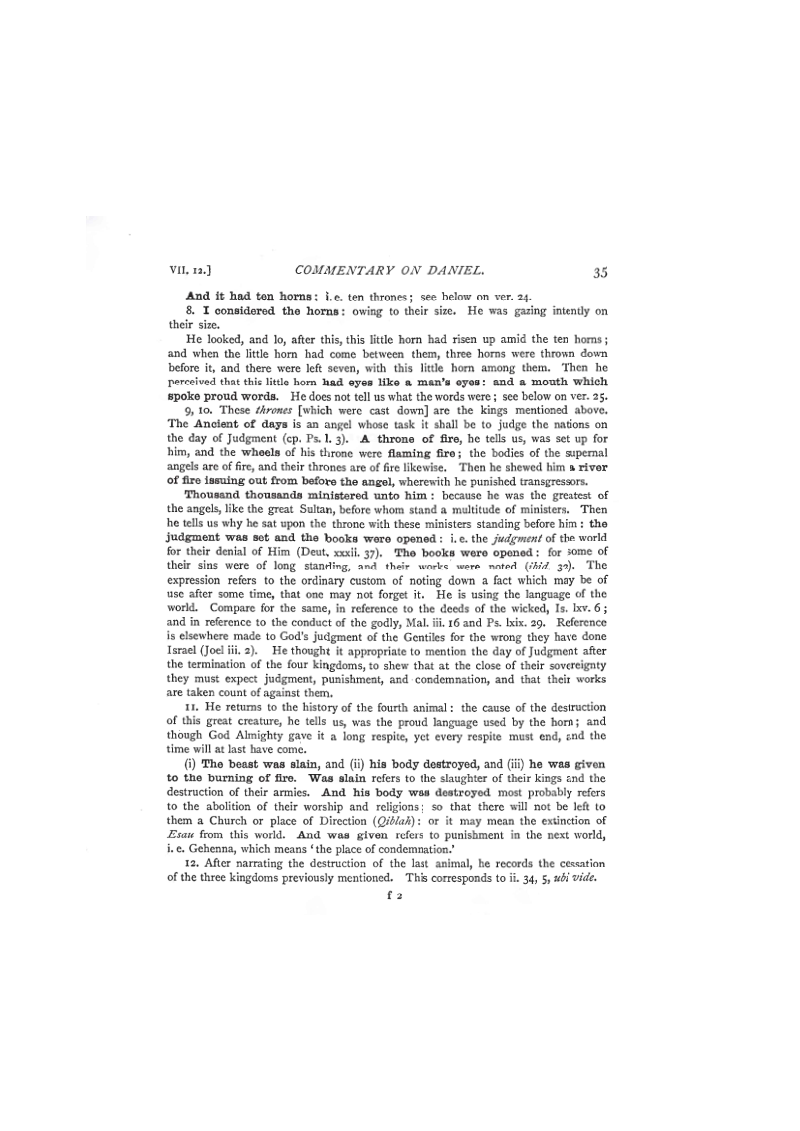Yefet ben Ali (10th century Karaite Jewish interpreter) argues the "Ancient of Days" in Daniel is an angel, not God.
- Type
- Book
- Source
- Yefet ben Ali Non-LDS
- Hearsay
- DirectReprintTranslation
- Reference
Anecdota Oxoniensia: A Commentary on the Book of Daniel by Jephet Ibn Ali the Karaite, trans. D.S. Margoliouth (Oxford: Oxford Clarendon Press, 1889), 35-36
- Scribe/Publisher
- Clarendon Press
- People
- Yefet ben Ali
- Audience
- Reading Public
- Transcription
9, 10. These thrones [which were cast down] are the kings mentioned above. The Ancient of days is an angel whose task it shall be to judge the nations on the day of Judgment (cp. Ps. l. 3). A throne of fire, he tells us, was set up for him, and the wheels of his throne were flaming fire ; the bodies of the supernal angels are of fire, and their thrones are of fire likewise. Then he shewed him a river of fire issuing out from before the angel, wherewith he punished transgressors.
Thousand thousands ministered unto him: because he was the greatest of the angels, like the great Sultan, before whom stand a multitude of ministers. Then he tells us why he sat upon the throne with these ministers standing before him: the judgment was set and the books were opened: i. e. the judgment of the world for their denial of Him (Deut. xxxii. 37). The books were opened: for some of their sins were of long standing, and their works were noted (ibid. 32). The expression refers to the ordinary custom of noting down a fact which may be of use after some time, that one may not forget it. He is using the language of the world. Compare for the same, in reference to the deeds of the wicked, Is. Ixv. 6 ; and in reference to the conduct of the godly, Mai. iii. 1 6 and Ps. Ixix. 29. Reference is elsewhere made to God's judgment of the Gentiles for the wrong they have done Israel (Joel iii. 2). He thought it appropriate to mention the day of Judgment after the termination of the four kingdoms, to shew that at the close of their sovereignty they must expect judgment, punishment, and condemnation, and that their works are taken count of against them. . . . 13. The Messiah is likened to a man in contrast to the four kingdoms, which were likened to beasts. For two reasons. One is, because he is wise and knows his Lord. A second, because he is lord of all.
With the clouds of heaven: because God Almighty [shall] send him, and men shall witness him as they witness the clouds. Then we are told how he came to the angel who sat judging the people, and how the angel let him come before him and close to him, and then how God gave the kingdom to him.
- Citations in Mormonr Qnas
The B. H. Roberts Foundation is not owned by, operated by, or affiliated with the Church of Jesus Christ of Latter-day Saints.

